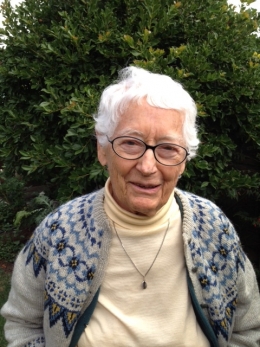 Priscilla "Tilly" Shaw. Photo by Rosie King
Priscilla "Tilly" Shaw. Photo by Rosie King
137 pages
2013
For the complete text [PDF] of Professor Priscilla "Tilly" Shaw: Poet, Teacher, Administrator on the University of California's escholarship site
A literary scholar, poet, and UC Santa Cruz faculty member in literature from 1966 to 1993, Tilly Shaw participated in this oral history interview in the spring of 2013. Shaw arrived in the second year of the campus, for the opening of Stevenson College in 1966-67, as a visiting faculty member from Yale. In 1967 the Board of Studies in Literature hired her as a tenured faculty member. She became one of very few tenured women during UCSC’s early days. Acutely interested in gender dynamics, Shaw discussed the evolving sexual politics that played out in the social and intellectual climate of the campus over the course of her three and a half decades on the faculty. The oral history also addresses some of her experiences and perceptions as a member of Academic Senate and other committees and as chair of literature from 1984 to 1988.
Like many faculty members hired during the relatively informal early years, Shaw recalls a certain degree of confusion about whether or not her initial campus visit constituted a formal job interview, and some surprise when she was offered an appointment. Later, in helping to shape the campus affirmative action plan, she had a role in creating explicit policies to guide hiring and other personnel processes. Also like many of her contemporary colleagues, she witnessed the gradual attenuation of the original vision for UCSC’s residential college system, brought on in part by the often competing, unsustainable faculty workloads collectively exacted by colleges, administrative committees, and boards of study.
Shaw touches repeatedly on the socioeconomic and familial circumstances—as well as the personal and intellectual proclivities—that shaped her interests in comparative literature, poetry, and pedagogy. Throughout her career she sustained a deep wariness of economic and institutional elitism, combined with respect for some time-honored conventions of academic respectability—a complex, sometimes contradictory set of attitudes that she explores in the oral history.

 Santa Cruz, CA
Santa Cruz, CA



